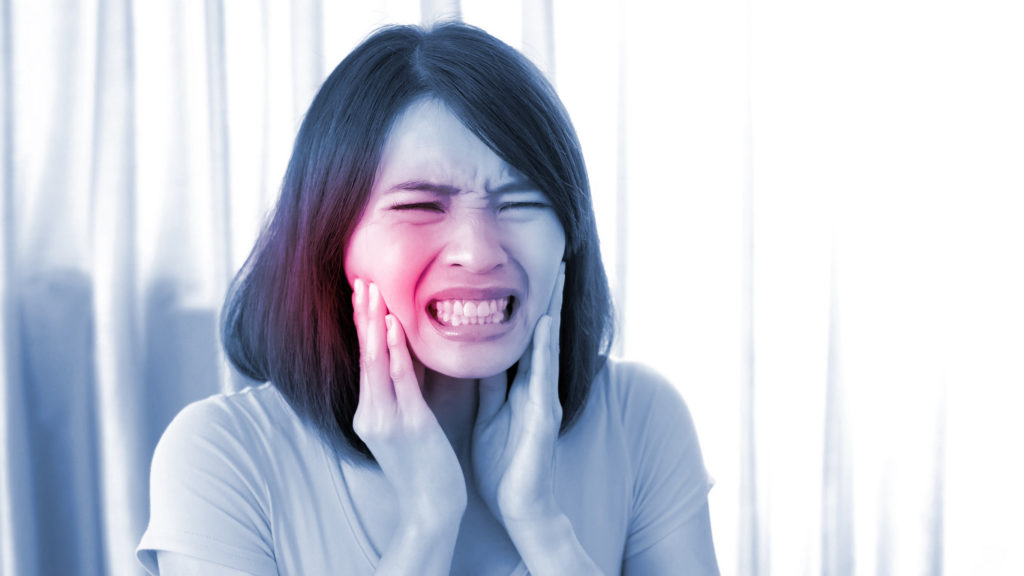Teeth grinding, known as bruxism, is a condition that causes individuals to clench, or grind their teeth as a result of stress, anxiety, etc. Chronic bruxism has the potential to result in the fracture, loosening, or loss of teeth. It can also wear teeth down and cause both oral and jaw pain.
Signs and Symptoms of Bruxism
Since teeth grinding often occurs during sleep, many people are unaware that they grind their teeth. So, it is important to know the signs and symptoms to watch out for. If you notice any of the following, we suggest you speak with our clinical staff about your options and treatment:
- Headaches
- Teeth that are flattened, fractured, chipped, or loose
- Worn tooth enamel that exposes deep layers of your tooth
- Tooth pain or sensitivity
- Jaw, neck, or face pain or soreness
- Sleep disruption
- Grinding sounds while asleep
- Temperature-sensitivity in teeth
- Tooth indentations on the tongue
- Aching and/or stiffness of the face and temples just after waking up
Common Causes of Bruxism
- Oral Problems: Tooth issues such as an abnormal bite, missing, or crooked teeth can cause individuals to grind their teeth. There may also be an issue with your temporomandibular joint (TMJ) or the muscles around the jaw. Children are also more likely to grind their teeth when their teeth are misaligned or growing in.
- Anxiety & Stress: Worrying excessively can cause you to clench your jaw and work it back and forth. Problems in the workplace, relationship issues, financial troubles, and other bothersome situations can result in emotional distress that can, in turn, cause some individuals to grind their teeth.
- Other Medical Conditions: Certain disorders like Parkinson’s disease, Huntington’s disease, and sleep disorders such as sleep apnea can cause teeth grinding. The condition can also arise as a side effect of certain medications, such as antidepressants.
Risk Factors & Complications
There are certain risk factors that can increase your chances of teeth grinding. It is important to note that these factors do not necessarily mean you will develop bruxism. However, if you suspect you are suffering from the condition, the following factors should be considered:
- Stress: Anxiety and stress can lead to teeth grinding, along with anger and frustration.
- Age: Grinding is common in young children and in many cases subsides prior to adulthood.
- Medications & Other Substances: Teeth grinding is an uncommon side effect of some psychiatric medications, such as antidepressants. Drinking caffeinated beverages or alcohol may also increase your risk of teeth grinding, especially if consumed in excess.
- Family Members with Bruxism: Teeth grinding tends to run in families. If you have a family member who grinds their teeth, you may be at higher risk.
- Other Disorders: Teeth grinding can be associated with some mental health and medical disorders, as well as certain sleep-related disorders.
Treatment
We can help identify the best solution for your unique situation. In severe cases where tooth damage or jaw pain is present, Dr. Otero may recommend treatment options that include, but are not limited to:
- Splints & Nightguards: Constructed of hard acrylic or soft materials, these devices are designed to keep teeth separated from each other in order to avoid the damage caused by grinding and clenching. At Otero Family, Cosmetic & Implant Dentistry, we can make you a customized guard or retainers to protect your teeth from further damage linked to bruxism.
- Dental Correction: In cases where tooth wear has led to sensitivity or the inability to chew comfortably, Dr. Otero may recommend restorations or crowns to repair the damage grinding has caused.
If you suspect you may be suffering from bruxism, contact us via our website or call us at (910) 270-9344.

